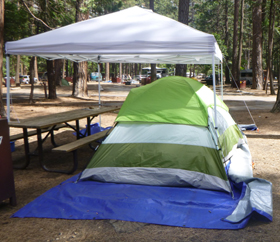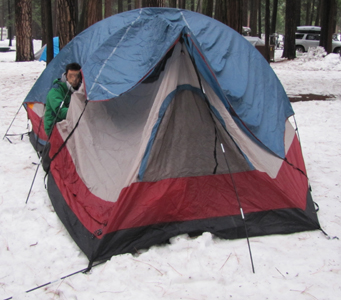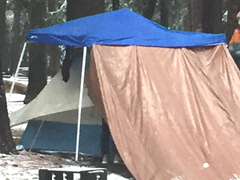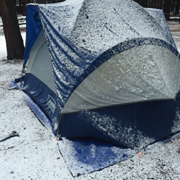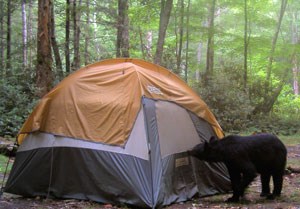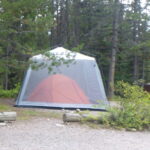Want to buy / find a cheap tent?
Many of the following pictures at the top of this page were taken in a 20 hour period in August at Tuolumne Meadows campground, Yosemite National Park. The evening had completely clear starry skies. At a little before midnight it started drizzling and then it poured. Many people did not have good tents and had to cover them with an extra tarp or plastic sheeting.
(Near the end of the page are tent mistakes from winter camping)
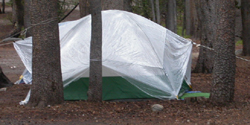
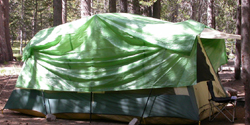
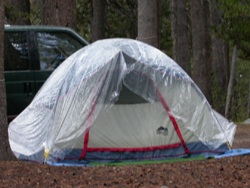
There are dozens of varieties of cheap tents and the prices are very tempting. If you were only going to use it for the kids to sleep out in the backyard, or if you were certain that it would never rain when you camp out, you could get away with buying one.
A good tent has a full rainfly that goes all the way down the outside of the tent.
The one below also has a vestibule (mini covered front porch) as well.
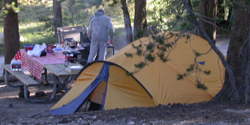
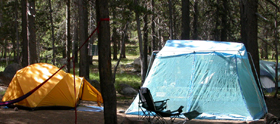
A good tent will have full zippers around doors and windows, not flaps. It will have full zippers around window and door covers in the rain fly, not flaps. Pitch the tent and test the zippers to see if they open and close easily.
The tent and rain fly should pitch taut. There should be a small amount of air space all around between the fly and the tent when it is pitched.
Some of the people in the campground that night did not have a tarp to cover their cheap tents and moved into their cars until daylight, then packed up and went home. Most people packing up also did not have rain jackets and did their packing in a drizzle as their sweatshirts got slowly soaked.
Some people must have used their tents previously and knew they would leak, because they came prepared with an extra tarp set up as a rainfly.
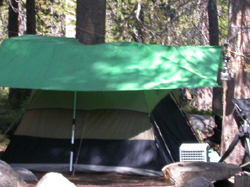
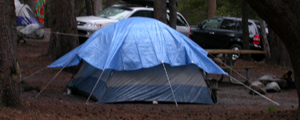
Someone was a perhaps a little overly prepared, as this tent looks like a good one with a full rainfly underneath the tarp. (Was the rainfly a bit old and leaky?)
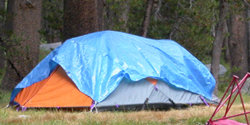
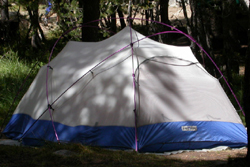
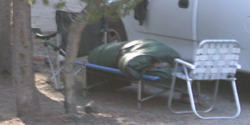
The family below had a great campsite set up with a dining canopy over the picnic table and playpen, and raft for fun, but the tent didn’t have a full rainfly. They packed up the next morning and the kids who had been playing on the river the day before got their vacation cut short.
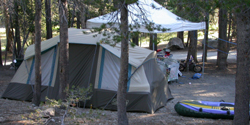
( Below are tent mistakes from winter camping we have seen.)
Below is a photo of a really good tent, the right shape to shed snow or rain and with a rainfly that goes all the way down the sides. But to protect the bottom from rocks the user put a big blue tarp under it. The problem is that the tarp sticks out a ways from the sides. So if it rains, the rain will run down the sides and create a big puddle on the tarp. It’s better to custom cut a thick plastic bottom protection, a tent “footprint,” that fits completely under the bottom of the tent.
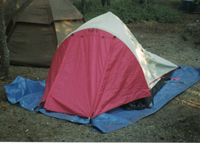
On the 2017 winter Yosemite trip these people pitched their tent incorrectly. (Many tents have instructions printed on the bag, did they read them? If they borrowed it from someone did they ask for instruction on how to pitch it? Did they try pitching it before the trip?) When they were having difficulty with it they did not ask other more experienced campers they were traveling with for help. In the dark, from a distance, it looked to the other campers as if they were okay. They were found trying to sleep in their car in the morning and complained that their tent was “unstable,” as if to say it was a fault of the construction/design of the tent, rather than their failure to properly put the ends of the rain fly tent poles into the ring pins at the base of the tent. As far as the rest of the group could tell, it looked as though they had just stuck the ends of the rain fly tent poles in the snow.
No good tent should have the ends of the rain fly poles in the ground or in the snow. All good tents will have tabs at the corners with grommets or pockets or ring pins for the ends of poles to go in to, as in the example below from this page: How to pitch the Cabella eight person tent.
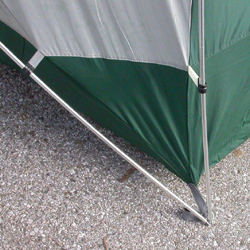
On the 2019 winter trip we convinced neighbors that the dining canopy they set up over their poorly designed tent was a mistake, as it would collapse with the weight of the expected overnight snow (their gear was already wet already due to not having a rain fly that goes all the way down the side of the tent):
And here, a tent on the second day of a winter Yosemite trip, the occupants said their sleeping bags were already getting moist. You can see why: the sides of their tent stuck out beyond the rain fly overhang, and they had pitched it on a tarp that stuck out from the sides and collected rain water that seeped in though the tent bottom. (They had, in effect, pitched their tent in a puddle.) On this second day of the trip it started snowing, adding to the accumulation of water inside their tent.
Would you pitch your 8 foot diameter tent in an 8 foot diameter puddle?
That is, in effect, what these campers did:
At the De Anza College Outdoor Club we recommend a freestanding dome tent with a full rain fly. And we suggest you bring the tent to the one of the trip signups sessions, listed at Outdoor Club Coming Attractions. If you insist on using a tent with guy lines, ways to improve it can be found at:
If you’ve been drinking enough water to stay healthy, you will need to get up in the middle of the night. This gives you an opportunity on a winter trip to check the tent for snow accumulation. A little insulation is okay, but knock a bunch off if it’s been snowing heavily. On one De Anza Outdoor Club trip a tent collapsed from too much snow (no one was hurt).
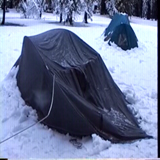
– – – – – – – – – – – – – – – – – – – – – – – – – – – – – – – – – – – – – – – – – – – – – – – – – – – – – – – – – –
And another cheap tent without a full rainfly, AND . . . a violation of Park service campground rules
In the campgrounds you must pitch your tent IN your campsite, not down by the river at a nice small beach:
If you decide to pitch your tent “out of bounds” you might be lucky and find the violation notice on your tent (or in this case, on a portable charcoal grill)
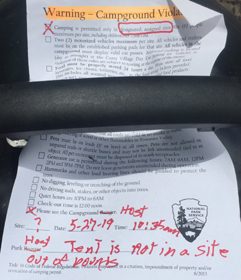
OR you might not be that lucky and could find yourself trying to track down your confiscated tent.
And you might find interesting reading at Yosemite National Park regulations, policies and rules links.
– – – – – – – – – – – – – – – – – – – – – – – – – – – – – – – – – – – – – – – – – – – – – – – – – – – – – – – – – –
and from the National Park Service:
This tent not only has an inadequate rain fly, pitched badly so the rain fly does not function at all, it also seems to have something in it that smells good to the bear:
see details about proper food storage.
Here is what it can look like when a bear gets done investigating a tent:
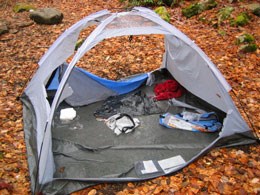
– – – – – – – – – – – – – – – – – – – – – – – – – – – – – – – – – – – – – – – – – – – – – – – – – – – – – – – – – –
For info on the logistics of where to pitch your tent and staying warm and comfy overnight camping in a tent in the snow, go to: First-timer’s instructions
There’s easy camping info at: Have more fun camping
Camping solutions for women answers typical questions.
for fun: an eight person tent holds this many campers
How to pitch the Cabela eight-person tent
For a laugh, Camping Blunders has tales of tent mistakes.
If you expect lots of mosquitos you could pitch your tent IN a screenroom:
Camping in a Yosemite National Park meadow in 1937:
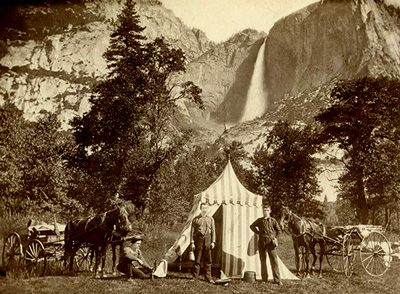
______________________________
(Links to all De Anza Outdoor Club Coming Attractions are here.)
______________________________
——————————————————————-
The author of this webpage, (written as a reading assignment for my students), does not give any warranty, expressed or implied, nor assume any legal liability or responsibility for the accuracy, completeness, or usefulness of any information, product, or process included in this website or at websites linked to or from it. Users of information from this website assume all liability arising from such use.
